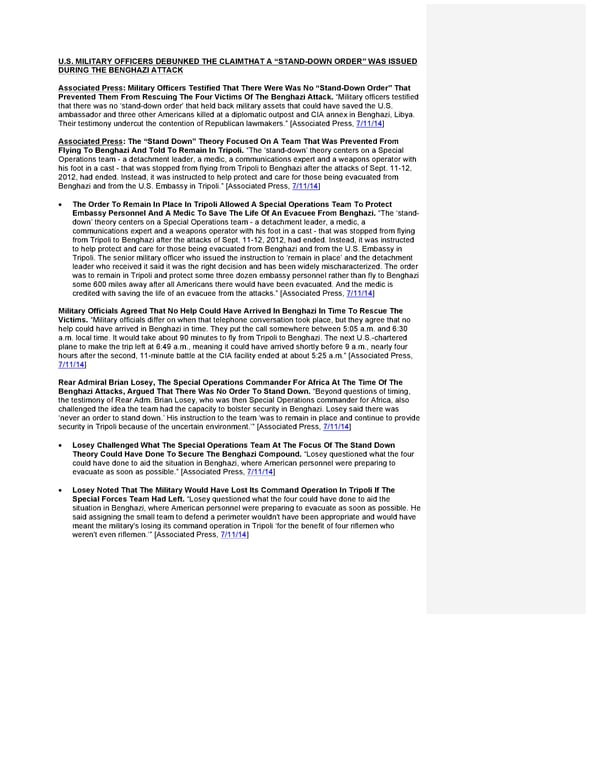U.S. MILITARY OFFICERS DEBUNKED THE CLAIMTHAT A “STAND-DOWN ORDER” WAS ISSUED DURING THE BENGHAZI ATTACK Associated Press: Military Officers Testified That There Were Was No “Stand-Down Order” That Prevented Them From Rescuing The Four Victims Of The Benghazi Attack. “Military officers testified that there was no ‘stand-down order’ that held back military assets that could have saved the U.S. ambassador and three other Americans killed at a diplomatic outpost and CIA annex in Benghazi, Libya. Their testimony undercut the contention of Republican lawmakers.” [Associated Press, 7/11/14] Associated Press: The “Stand Down” Theory Focused On A Team That Was Prevented From Flying To Benghazi And Told To Remain In Tripoli. “The ‘stand-down’ theory centers on a Special Operations team - a detachment leader, a medic, a communications expert and a weapons operator with his foot in a cast - that was stopped from flying from Tripoli to Benghazi after the attacks of Sept. 11-12, 2012, had ended. Instead, it was instructed to help protect and care for those being evacuated from Benghazi and from the U.S. Embassy in Tripoli.” [Associated Press, 7/11/14] • The Order To Remain In Place In Tripoli Allowed A Special Operations Team To Protect Embassy Personnel And A Medic To Save The Life Of An Evacuee From Benghazi. “The ‘stand- down’ theory centers on a Special Operations team - a detachment leader, a medic, a communications expert and a weapons operator with his foot in a cast - that was stopped from flying from Tripoli to Benghazi after the attacks of Sept. 11-12, 2012, had ended. Instead, it was instructed to help protect and care for those being evacuated from Benghazi and from the U.S. Embassy in Tripoli. The senior military officer who issued the instruction to ‘remain in place’ and the detachment leader who received it said it was the right decision and has been widely mischaracterized. The order was to remain in Tripoli and protect some three dozen embassy personnel rather than fly to Benghazi some 600 miles away after all Americans there would have been evacuated. And the medic is credited with saving the life of an evacuee from the attacks.” [Associated Press, 7/11/14] Military Officials Agreed That No Help Could Have Arrived In Benghazi In Time To Rescue The Victims. “Military officials differ on when that telephone conversation took place, but they agree that no help could have arrived in Benghazi in time. They put the call somewhere between 5:05 a.m. and 6:30 a.m. local time. It would take about 90 minutes to fly from Tripoli to Benghazi. The next U.S.-chartered plane to make the trip left at 6:49 a.m., meaning it could have arrived shortly before 9 a.m., nearly four hours after the second, 11-minute battle at the CIA facility ended at about 5:25 a.m.” [Associated Press, 7/11/14] Rear Admiral Brian Losey, The Special Operations Commander For Africa At The Time Of The Benghazi Attacks, Argued That There Was No Order To Stand Down. “Beyond questions of timing, the testimony of Rear Adm. Brian Losey, who was then Special Operations commander for Africa, also challenged the idea the team had the capacity to bolster security in Benghazi. Losey said there was ‘never an order to stand down.’ His instruction to the team ‘was to remain in place and continue to provide security in Tripoli because of the uncertain environment.’” [Associated Press, 7/11/14] • Losey Challenged What The Special Operations Team At The Focus Of The Stand Down Theory Could Have Done To Secure The Benghazi Compound. “Losey questioned what the four could have done to aid the situation in Benghazi, where American personnel were preparing to evacuate as soon as possible.” [Associated Press, 7/11/14] • Losey Noted That The Military Would Have Lost Its Command Operation In Tripoli If The Special Forces Team Had Left. “Losey questioned what the four could have done to aid the situation in Benghazi, where American personnel were preparing to evacuate as soon as possible. He said assigning the small team to defend a perimeter wouldn't have been appropriate and would have meant the military's losing its command operation in Tripoli ‘for the benefit of four riflemen who weren't even riflemen.’” [Associated Press, 7/11/14]
 2016er Attacks - HRC Defense Master Doc Page 13 Page 15
2016er Attacks - HRC Defense Master Doc Page 13 Page 15